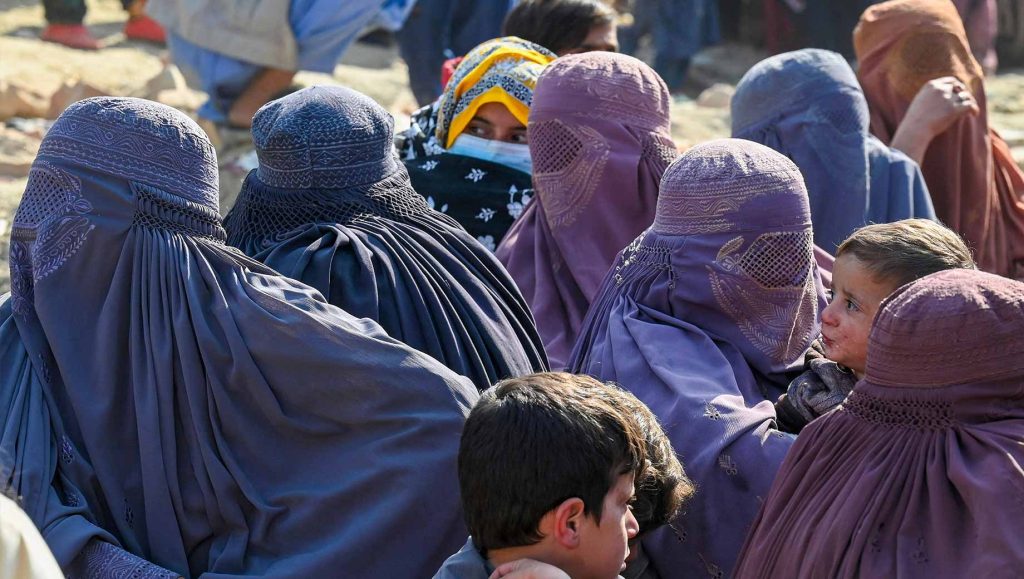Since the Taliban’s return to power in August 2021, Afghanistan’s women have been subjected to an unprecedented wave of repression. What began as a rollback of rights under the group’s previous rule has escalated into a systematic attempt to erase women from public life. Through harsh edicts and gender-based violence, the Taliban has imposed a regime of gender apartheid that affects every aspect of life for Afghan women and girls.
The Widespread Erasure of Women’s Rights
Under the Taliban, Afghan women have seen their rights vanish almost overnight. Public spaces are off-limits: schools and universities are closed to girls, most workplaces are restricted to men, and even basic activities such as visiting parks or bathing in public bathhouses have been banned. The Taliban’s infamous edict requiring women to cover their faces in public and mandating that they must always be accompanied by a male guardian has further isolated women from society.
In cities like Qandahar, where the Taliban’s leadership is based, these restrictions are enforced with extreme severity. Women have been reduced to shadows of their former selves, forbidden from appearing in public without a male escort or expressing their views. The Taliban’s leadership has dictated that women’s voices are no longer allowed to be heard, whether in the public sphere or in the home.
The Human Cost of Education Ban
One of the most heartbreaking aspects of Taliban rule has been the denial of education to Afghan girls. For many young women, the closure of secondary schools has been a devastating blow. Despite the traumas, girls continued their studies at underground schools.
For girls, the future seems bleak. When they ask themselves what the point of education is when they cannot graduate, cannot work, and cannot imagine a life beyond the four walls of their home, despair sets in. Many young girls now face limited choices: marry young or find some form of work, usually in exploitative conditions, like sewing school uniforms for younger girls who are allowed to attend primary school.
Poverty and Gender Inequality Deepen the Crisis
The economic collapse in Afghanistan, exacerbated by the Taliban’s return, has further deepened the suffering of Afghan women. The economic hardship is compounded by a widespread gender bias that affects how resources are distributed within families. In malnutrition wards across Kabul, doctors reported that girls are more likely to suffer from malnutrition than boys, as families, when faced with scarce resources, prioritize feeding their male children. The gender inequality that permeates every part of Afghan society is now contributing to an ongoing humanitarian crisis.
Small Acts of Defiance in the Face of Tyranny
Despite the overwhelming repression, Afghan women continue to find ways to resist. These acts, though small, offer a glimmer of hope in an otherwise bleak landscape. Women and girls have created underground education networks, attended secret gatherings, and even participated in informal celebrations, such as birthday parties or art classes. These moments of rebellion, though seemingly inconsequential, are profound forms of resistance against a regime that seeks to strip them of their humanity. Many women are fleeing the country in search of freedom, but the majority remain trapped, their voices stifled by a regime that will stop at nothing to erase them.
The World’s Indifference and the Call for Action
The international community has largely ignored the plight of Afghan women, with some countries even willing to engage diplomatically with the Taliban regime. As the UN Special Rapporteur Richard Bennett has noted, what is happening in Afghanistan is more than a political issue—it is an affront to the humanity of women and girls, an attempt to erase them entirely from society. The Taliban’s policies reflect a profound rejection of women’s basic human rights, and the world must not let this injustice go unnoticed.
The Taliban’s regime is not just a political movement—it is a violent, misogynistic attempt to wipe Afghan women off the map. And yet, despite everything, Afghan women continue to fight, survive, and resist, refusing to let their voices be silenced.
The international community has a responsibility to amplify their voices, to ensure that the world does not forget the women of Afghanistan as they endure the most brutal and systematic repression in modern history.


